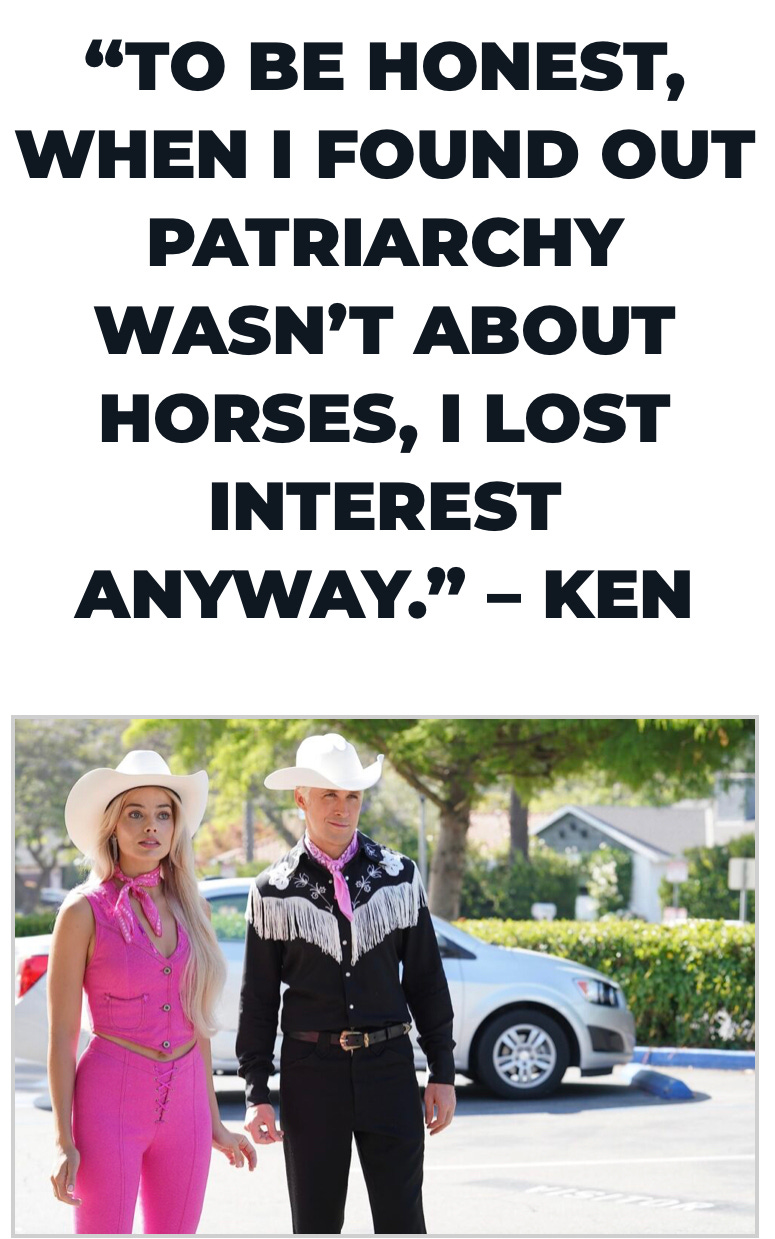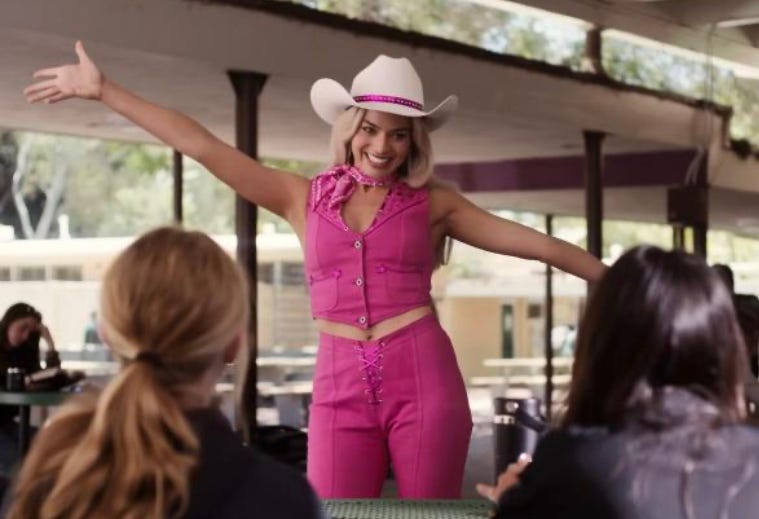Everybody seems to be sharing their thoughts about the Barbie movie, so I will, too. You’re welcome!
Normally, I would offer up my opinion with a caveat of “I humbly offer these measly ideas and they’re probably wrong,” perhaps followed up with a self-deprecating anecdote about how I spilled tea down my shirt and fell down the stairs. But I feel confident because this film has reminded me that I don’t actually have to apologize for being the brilliant, gorgeous, capable human that I am (although I will always and forever identify as a Weird Barbie.)
After all, flagrant self-aggrandizement is the foundation of the film’s fictional Barbieland, where its fabulously-coiffed citizens encourage each other unconditionally and accept accolades without a flinch: “I’ve worked hard for this and I deserve it!” This riotously pink positivity has engendered an environment where “all problems of feminism and equal rights have been solved,” and these dolly women nary second-guess their value or feel insecure about, y’know, just existing.
Of course, the plot revolves around one particular Barbie’s relatable existential crisis, and when she discovers that women in the Real World do not enjoy the same autonomy, opportunity, and support as Barbieland dwellers, hilarious and meaningful hijinks ensue.
Lauded—as in multiple Oscar nominations, hello—for her joyfully messy, modern treatises on womanhood, Barbie director Greta Gerwig applies her signature multidimensional lens to the impact of Barbie’s outsized dimensions. But in order to fully appreciate her elastic plastic take, we’ve gotta wrap our big beautiful minds around some hot pink paradoxes:
On one fused-finger hand, Barbie represents literally every shitty conditional requirement that society serves women: Hold ourselves to unreasonable beauty standards at the cost of physical and mental health. Cultivate vapid personalities that others can easily project their own desires and anger upon. Count those carbs but stoke a ravenous appetite for earth-destroying fast fashion. Until very recently, calling someone a “Barbie” was an epithet denoting superficiality but also probably really good hair.
In the other plastic palm is the irony that Barbie was a feminist icon before there was even a word for it. Dreamed up in the 1950s by pioneering business badass Ruth Handler, Barbie was meant to give little girls a toy option to play with besides baby dolls—and expand their imaginations of what they could become beyond mothers. (And obviously, the clothes were way cuter.) The tenth child of Jewish immigrants, Ruth made a bazillion dollars for Mattel, the multinational toy company she founded, before getting into trouble with the IRS, then went on to whip up another fortune in prosthetics after battling breast cancer. (If you really want to compliment a person, call them a “Ruth.”)
The film playfully tickles upon all of this as well as the radical notion that the bedrock of Barbie’s egalitarian utopia—which includes plus-size and trans Barbies—requires the absence of control by men, all of whom are “just Ken.” This has been quite the trigger for those viewers who enjoy and benefit from the crushing power of Real World patriarchy, though one of the main points of the movie is that toxic masculinity harms everybody.
The most egregious issue at hand for Real World women is conspicuously absent in the plot, yet somehow manages to seem ubiquitous. Other than the all-women Supreme Court references, the film very carefully skirts the issue of body autonomy and reproductive healthcare, though I suppose the little girls smashing their baby dolls isn’t exactly subtle. Surely I can’t be the only one who’s noticed that Barbie and Planned Parenthood share the same shade of unapologetic pink. (Oh by the way, here is the latest information about abortion bans by state, and a friendly reminder that misoprostol continues to be safe, legal, and available by mail order.)
For many, witnessing Barbie emerge as an inclusive icon is deeply confusing. As a second-generation feminist, I was not allowed to play with Barbies as a kid (though my Bionic Woman and Stretch Armstrong still managed to have legions of Smurf babies.) I’ve always had mixed feelings about the legend of the tall blonde shiksa created by a brilliant Jewish businesswoman, but I am all in for how this movie presents a doll once dismissed as dumb as the symbol for female agency she was all along.
What a gift that I got to see it with some of my favorite lady friends and my own daughter, who cut the hair of plenty of Barbies in her time and has somehow grown up in the Real World with her own self-worth marvelously intact. (Who didn’t cry when Rhea Perlman, playing Ruth in the movie, says, “We mothers stand still so our daughters can look back to see how far they've come”?)
In my well-informed and valid opinion, the Barbie movie synthesizes the bubble gum inspo we all anticipated with the unexpected messaging that everyone who identifies as a woman needs to hear:
That feeling “dark and weird and crazy” in this lopsided world is not the antithesis of femininity, but the root of its power.
We can trust that our worth is intrinsic, a birthright that does not waver with the cellulite on our thighs or designer clothes in our closets.
When we give up comparing ourselves to others and accept the totality ourselves, we make room for agency and freedom for everyone.
These missives have been bouncing around my head as of late as we watch the baddasses of the US Women’s Soccer team shred the fields of the 2023 FIFA Women’s World Cup after making history by becoming the first professional women’s athletes to win pay equity in 2022.
They’ve mingled with my tears as we mourn the passing of Sinead O’Connor, the doll-faced Irish oracle who railed against hypocrisy and injustice and found herself caught in the crosshairs of the entire world’s toxic masculinity for her trouble. (Also a deep curtesy for the departure of King Weirdo Paul Reubens aka Pee-Wee Herman, who might’ve been the first to give double entendre to our toys.)
Remembering to hold on to my own value also helped me handle a vitriolic social media troll this week. Thank you to the many lovely friends who reminded that anyone who tears down others for sport on the internet must not feel very Barbie on the inside, and what this person thinks of me and my family is none of my business. In the spirit of Gwyneth Paltrow’s Barbie-esque largesse, I wish them well.
While the Barbie movie probably won’t banish Clarence Thomas and Brett Kavanaugh to the swamp or magically close the gender pay gap, at least it’s made poking at the patriarchy fun again. And it’s underscored that we’re all entitled to be here expressing our own gorgeously opinionated viewpoints, whether we’re weird or basic or all the possibilities in between.
By far the biggest Barbie bonus is the enjoinder that the best way to make the Real World better is for women to lift each other up—and everyone else, too.
We are all Kenough ~ JLL







I look forward to your writing every week-I love this review. I had no interest in the movie til now! My fave 21st century mantra is “you do you.” I bought my niece “astronaut Barbie” and “computer programmer Barbie,” but now that she’s a teen she’s into makeup artistry and fashion design. The awesome thing about the 21st century is that there is less gatekeeping as to who can be a feminist. And I totally remember you doing the Pee Wee Herman dance at MHS in the halls after the first movie came out😆 so sad about Paul Rubens and Sinead O’Connor. She was one of my high school heroes.
I read this before I saw the movie, and was able to appreciate Barbie even more. Thank you for sharing your glorious writing. You truly capture my own thoughts, and give me new ones, too.